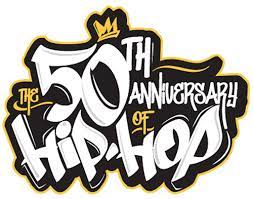
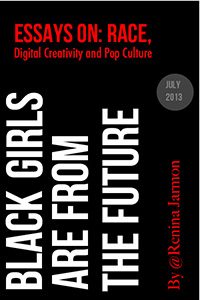
This is dedicated to all the Black girl feminists and the people who love them.
This is dedicated to East Oakland, California.
This is dedicated to SBee who loved me so much that he was a reader in the 2006 blogspot days and when prof. bell hooks died in 2021 he sent me a *HOTMAIL* email asking me if I was okay and telling me that he knew that I loved her and blogged about her and hip hop all the time.
This is dedicated to Britini Danielle who was a day one reader from 2006, a cheerleader, AND she contributed to my Gofundme for my community self-funded sabbatical. Money is my love language and I love you back.
I became a writer, in part, because I was trying to make sense of being a Black girl feminist, who loved rap music and hop culture from East Oakland, California.
The music made sense to me because it described, and helped me to make sense of the world I lived in. The violence, the drugs, the Black people living and loving and raising their children to the BEST of their ability. Rap music helped me to develop a language to understand what it meant to be Black in the face of White supremacy. It did not speak to my Black girlhood in a wholistic way.
Plot twist. Rap music was also very homophobic, AND laden with misogynoir. Misogynoir, a term created by Prof. Moya Bailey was just added to the Merriam Webster Dictionary. Moya and her crew at Spelman held Nelly accountable for the Tip Drill video. Black girls been in trenches.
Let me be crystal clear, Black girls was outside too. We had YoYo, McLyte, Queen Latifah on the national rap scene. Still. It was masculine and often hostile space for Black girls.
How was I able to listen to music that called me fifty million hoe’s? Well, very carefully.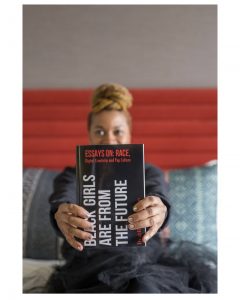
So, I blogged. I blogged and blogged.
My name is Renina Jarmon and I was a Black feminist blogger from 2006 to 2013. I was one of the bloggers that created the think piece. Legacy.
I wrote about masculinity, I wrote about patriarchy, I wrote about Nate Dogg, I wrote about bell hooks, I wrote about Black Women’s Sexuality, I wrote about The Clipse, I wrote about heternormativity.
I wrote about how people listened to rap music in order to feed something dark inside of them.
I wrote about the White consumption of Black death.
I wrote about the Black consumption of Black death.
I wrote about my daddy and feminism.
I wrote about Black men and patriarchy.
I wrote about Buffy the Body as Venus Hottentot who is actually named Saarah Baartman.
I asked what “What if Rakim had the internet?”
I wrote about Barry Michael Cooper, the creator of the movie New Jack City. He then found me and TOLD ME to keep writing and continues to encourage me to this day.
I was writing to save my life, to create my voice and to find my people,
You have to remember that blogging arose right at the imminent decline of magazines and newspapers, and many of us were young. So we were able to use the internet to find each other.
My peers at the time were Unkut, NahRight, and The Smoking Section. 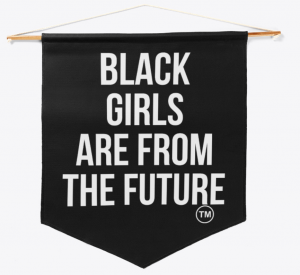
This summer marks the ten year anniversary of the publication of my first book. This book is in part, created because I my blog readers said that they would buy it.
I went on to blog with Black feminist Collective titled the Crunk Feminist Collective in 2010-2012 because Prof. Moya Bailey kept asking me to until I relented. Her most persuasive argument was “Girl, you already writing, just take your stuff and bring it over here, and I did.”
Writing at Racialicious was life altering because my words were exposed to people across race internationally who actually cared about what I had to say and left comments of praise, support and sometimes a combination of both.
So on the 50th Anniversary of Hip Hop and the 10 year anniversary of my book, I reflect on what I have contributed to the game and how blogging helped me shape myself and find my people.
Just like the rap world, the rap blogosphere was a masculine space. What I mean by that is while it celebrated Black youth culture, and music and storytelling, it also routinely portrayed women’s as whores who should be seen and not heard.
As you can imagine this was rough for me because I from East Oakland, California and I got a smart mouf.
There were two early moments that shaped my writing voice. I was in law school in 2005 and I wasn’t writing, writing yet. I was aggregating articles and giving little snippets.
Then ish changed. I cut Con Law to write about Jena Six and the title was “More Jena Six and Less Michael Vick” and readers found me and supported me. In that moment I began to wonder, if I am cutting Con law, to write about Black culture then maybe that is what I need to be studying. I ended up going graduate school at the University of Maryland AND teaching African American Studies there. FULL CIRCLE.
The second moment that had an impact on me was a moment with rap blog Nahright. I will never forget. The owner the blog called Karrine Stephans, the video vixen and author “a slore.” Very casually. I was one of a vocal few women on the site, and I said “Why she gotta be all that? If she is a slore then what does that make the men who sleep with her?” I paraphrase but that was the energy, and I was not being heard.
The third moment is that the Duke rape case dropped and I raised my hand during my evidence class to talk about the case and the entire room got quite. I was one of four Black women in a 130 student evidence course. TO THIS DAY I still remember the rule of law. It was the federal evidence that prevents a rape victim’s sexual history from being admitted because it is seen as unfairly prejudicial. I blogged about that and I felt community, on the blog that I did not have in the classroom.
The fourth moment occurred when Chris Brown beat Rihanna Fenty. A blogger posted the beaten face of Ms. Fenty and I was livid. Not only because he posted it, but because it felt like a betrayl. This right before smart phones and video phones dropped, so we didn’t really have celebrity media access then the way we do today.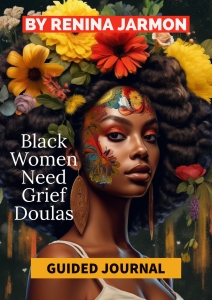
This moment changed me because what I learned is that while the rap blogosphere may support me when I am critiquing White supremacy and tell me that I am a great writer with a distinctive voice, they did not want to hear my mouth when I talked about Black men being accountable for violence against Black women. Period and on sight.
So in 2010 with the birth of the #hashtag, community and brand #Blackgirlsarefromthefuture I was about to find my home and find my people.
So in some ways writing about hip hop culture and my life publicly brought me to this beautiful culture that we have created. I sell hoodies, books, journals, and most recently guided journals that you can buy for 19.99. I have 85 left so get one for you and your friends. Community is all we got.
Girl You Ain’t an Imposter helps you to feel capable and spectacular at work.
Women of Color at Work will help you go from feeling dismissed and ignoring to thriving and collecting your well earned bag.
Pause, Rest Pivot is the journal you need when you are in a rut. You know you need to make your next move. Pause Rest Pivot gives you a space to create your own map to what is next. I congratulate women when they quit. It means that they are taking action in their lives to be their own superhero and we need more of that. #quittingseason
Death to Strong Black Women is a safe space for Black women to fall apart, be messy and vulnerable, take off the superhero cape and ask for help.
The Joy Jar is for a sister who needs a little bit more joy in her life.
Black Girl Love Notes is a journal that has love and appreciation notes for Black women. Most people appreciate Black women for doing things for them, Black Girl Love Notes appreciates Black women for existing. Period.
Fragile and Fearless celebrates the complexity of Blackwomanhood. Most people see Black women as sterotypes but this journal is a space for Black women to discuss how they see themselves. The call is coming from inside the house, not Hollywood.
Black Women Need Grief Doulas is a space for Black women to recognize, make sense of and make SPACE for their grief. Grief can be deadly if you don’t make space for it. It is sneaky, it can creep up on you one day and take you out .
I am an award winning African American studies lecturer and I believe that much of success as a teacher comes from writing publicly for so many years. People don’t like to be challenged, and writing online about race, class, gender and sexuality forced me to learn how to talk to people how did not agree but STILL engaged with the material. It is really something.
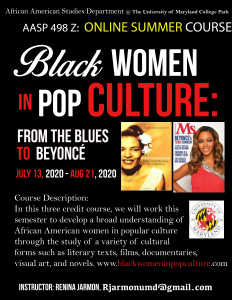
On this 50th anniversary of Hip Hop and the 10 year anniversary of my first book, I would like to think that my time spent in the trenches going to toe to toe with the rap blogosphere, advocating for women, asking Black men to interrogate Black patriarchy, enjoying new music together, and affirming that a Black girl from East Oakland had something to say.
Navigating the rap blogosphere and being a hip hop head taught me a very important lesson. When you are being called names, or you don’t like how you are being treated it is my right to leave and find a place that loves me.
Writing during those years really helped me to understand that some of these spaces would not accept of all of me, and that was okay because I had the ability to use my voice and find my place in the world and sometimes it would within hip hop culture and sometimes in would be in the future.
You can pre-order Black Girls Are from the Future: Memoir and Manifesto. Spring 2024 here.
My podcast is here. My news letter is here.
Black Girl Hip Hop Head Feminist Starter Pack (listed by release year)
Black Macho and the Myth of the Superwoman by Michelle Wallace
Feminism is for Everybody by bell hooks
When Chickenheads Come Home to Roost by Joan Morgan
“Hip Hop Beyond Beats and Rhymes” dir by Byron Hurt
Black Cool: One Thousand Streams of Blackness ed by Rebecca Walker
Black Girls Are From the Future: Essays on Race, Digital Creativity and Pop Culture by Renina Jarmon
Remember the blog days ya’ll. I took it back.
Which sites did you use to visit in that era?
Did I bring back memories with this post?